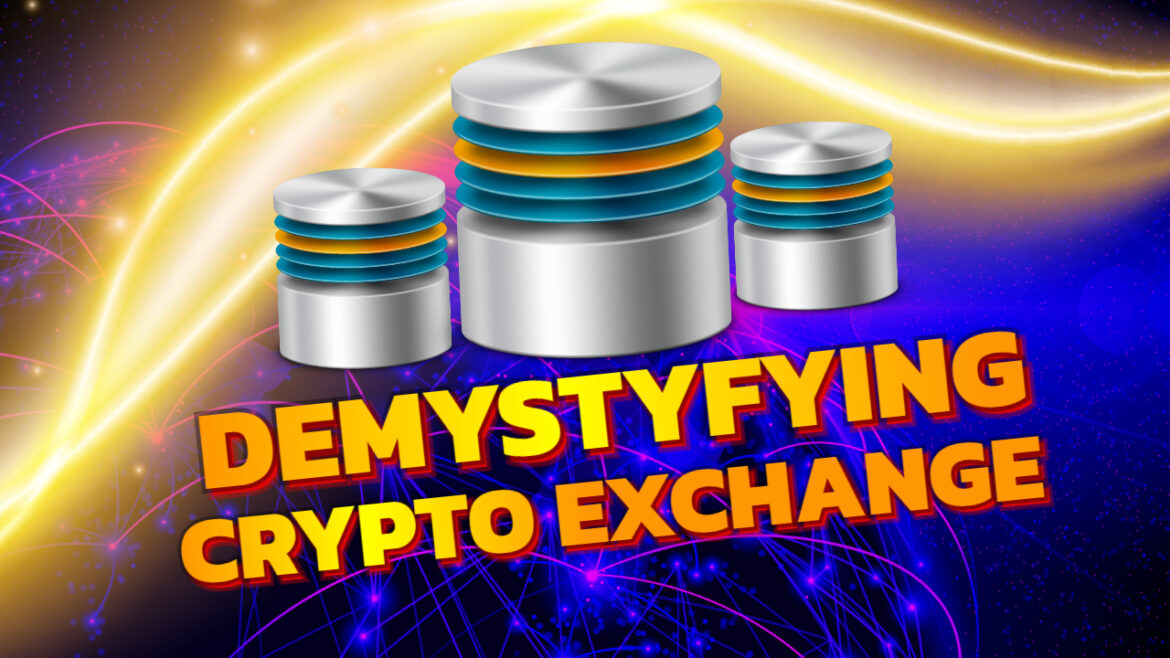In recent years, the world has witnessed an explosion in the popularity of cryptocurrencies. These digital assets, powered by blockchain technology, have attracted a massive following due to their decentralized nature, security, and potential for financial freedom. However, one of the primary challenges faced by users looking to trade cryptocurrencies is the need for a reliable platform to facilitate these transactions. Enter centralized cryptocurrency exchanges – the backbone of the crypto market that connects buyers and sellers, providing a seamless trading experience.
In this blog, we will delve deep into the world of centralized cryptocurrency exchanges, exploring their definition, functionality, advantages, disadvantages, and the role they play in the broader cryptocurrency ecosystem.
What Are Centralized Cryptocurrency Exchanges?
Centralized cryptocurrency exchanges (CEXs) are online platforms that operate as middlemen in the purchase, sale, and trading of cryptocurrencies. They function similarly to traditional stock exchanges, except instead of equities and securities, they deal with digital assets like Bitcoin, Ethereum, Ripple, and others. These exchanges connect cryptocurrency buyers and sellers by allowing them to submit buy or sell orders and match them with appropriate counterparties.
Does Phemex Qualify as a Centralized Cryptocurrency Exchange?
Today’s most major exchanges, including Phemex, is centralized. Centralized exchanges, such as Phemex, go through a procedure to list the numerous cryptocurrencies available on the market for their clients and the community to invest in or trade.
Ready to start trading with ease and efficiency? Register now on Phemex, the centralized cryptocurrency exchange that offers high liquidity, user-friendly interfaces, and top-notch security measures. Don’t miss out on the opportunity to explore the vast array of trading pairs and take advantage of our exceptional services.
Key Features and Functionality
- Order Books and Liquidity: Centralized exchanges employ order books to match buy and sell orders from users. The order book displays a list of all outstanding orders, indicating the price and quantity of the assets. Liquidity is a critical aspect of centralized exchanges, as higher liquidity leads to faster and more efficient trade executions.
- User-Friendly Interfaces: Most CEXs offer intuitive and user-friendly interfaces to cater to both novice and experienced traders. These interfaces typically include charts, trading pairs, order placement options, and account management features.
- Security Measures: CEXs are responsible for safeguarding users’ funds and personal information. Reputable exchanges employ robust security measures, such as two-factor authentication (2FA), cold storage for storing funds, encryption, and periodic security audits.
KYC and AML Compliance: To comply with regulations and prevent illegal activities like money laundering, CEXs often require users to complete a Know Your Customer (KYC) process and follow Anti-Money Laundering (AML) procedures.
Centralized vs. Decentralized Exchanges: Understanding the Key Differences
Centralized and decentralized exchanges represent two distinct approaches to facilitating cryptocurrency trading. Each type comes with its own set of characteristics, advantages, and challenges. To gain a comprehensive understanding of these exchanges, let’s explore the key differences between them:
Centralized Exchanges (CEXs):
- Intermediary Role: CEXs act as intermediaries, holding users’ funds and facilitating trades on their behalf. Users rely on the exchange’s infrastructure for buying, selling, and managing their cryptocurrencies.
- High Liquidity: Centralized exchanges generally boast high liquidity due to their large user bases and established market presence. This leads to faster trade executions and better price discovery.
- User-Friendly Experience: CEXs typically offer user-friendly interfaces suitable for beginners, making it easy to navigate through various trading pairs and place orders.
- Security Risks: Despite implementing security measures, centralized exchanges remain vulnerable to hacking attempts and pose a single point of failure, potentially putting users’ funds at risk.
- Regulatory Compliance: CEXs often need to comply with financial regulations and may require users to complete KYC and AML procedures to mitigate illegal activities.
Decentralized Exchanges (DEXs):
- No Intermediaries: DEXs function without intermediaries, allowing users to retain control of their funds. Trades occur directly between buyers and sellers via smart contracts or peer-to-peer protocols.
- Limited Liquidity: DEXs may suffer from lower liquidity compared to CEXs due to their decentralized nature. As a result, trade execution can be slower, and prices might differ across platforms.
- Greater Privacy: DEXs, in general, offer more privacy since users are not required to share sensitive personal information during the trading process.
- Enhanced Security: DEXs reduce the risk of large-scale hacks common in centralized platforms as they do not hold users’ funds. However, smart contract vulnerabilities remain a concern.
- No KYC Requirements: Most DEXs do not impose mandatory KYC processes, giving users greater anonymity and privacy while trading.
Both centralized and decentralized exchanges have their merits and drawbacks. Centralized exchanges offer high liquidity, a user-friendly experience, and faster trade execution but expose users to potential security risks. Decentralized exchanges prioritize user control, enhanced privacy, and reduced hacking risks but may suffer from limited liquidity and slower trade execution. To choose the right exchange, users should consider their individual needs, risk tolerance, and preferences for privacy and security. Diversifying trading activities across both types of exchanges can provide a balanced and comprehensive trading experience in the dynamic world of cryptocurrencies.
Is it Safe to Use Centralized Cryptocurrency Exchanges?
When administered by trustworthy platforms that prioritize comprehensive security measures, centralized cryptocurrency exchanges may provide a secure trading environment. While KYC protocols and encryption are used to secure customer data, there are inherent hazards to holding money on a third-party platform. Previous notable attacks have highlighted concerns, underlining the significance of using trusted exchangers. To reduce possible dangers, traders should exercise prudence, activate extra security measures such as two-factor authentication (2FA), and consider spreading their holdings across multiple exchanges. The need for vigilance and due diligence in maintaining a secure trading experience on centralized cryptocurrency exchanges cannot be overstated.
Advantages of Centralized Cryptocurrency Exchanges
- High Liquidity: Centralized exchanges generally have high liquidity due to their large user base. This liquidity ensures that users can easily buy or sell their assets at competitive prices.
- User-Friendly Experience: CEXs provide an accessible and straightforward trading experience, making them an ideal choice for newcomers to the cryptocurrency space.
- Customer Support: Reputable centralized exchanges offer customer support to assist users with various issues, such as account access, trading queries, and technical problems.
- Faster Transaction Speeds: Transactions on centralized exchanges tend to be faster since the platform processes trade internally rather than relying on the slower confirmation times of blockchain networks.
- Wide Range of Trading Pairs: CEXs offer numerous trading pairs, enabling users to exchange various cryptocurrencies and fiat currencies.
Disadvantages of Centralized Cryptocurrency Exchanges
- Lack of Control: Using a centralized exchange means entrusting your funds to a third-party entity. Users have limited control over their assets as they rely on the exchange’s security measures.
- Security Risks: Despite implementing security measures, centralized exchanges remain vulnerable to hacks and security breaches. If an exchange is compromised, users’ funds could be at risk.
- KYC and Privacy Concerns: The KYC process, while essential for regulatory compliance, raises privacy concerns as users are required to share sensitive personal information with the exchange.
- Single Point of Failure: Centralized exchanges represent a single point of failure in the cryptocurrency ecosystem. If an exchange experiences technical issues or goes offline, users may face difficulties accessing their funds and trading activities.
- Regulatory Risks: As centralized exchanges handle fiat currencies and operate within existing financial regulations, they may be subject to government oversight, leading to potential legal and regulatory challenges.
The Role of Centralized Exchanges in the Crypto Ecosystem
Centralized cryptocurrency exchanges play a crucial role in the overall cryptocurrency ecosystem. They act as bridges between the traditional financial system and the world of cryptocurrencies, making it easier for users to enter the crypto market. Their high liquidity and user-friendly interfaces attract traders from all walks of life, contributing to the widespread adoption of cryptocurrencies.
Moreover, centralized exchanges serve as significant sources of price discovery. The market prices of cryptocurrencies are heavily influenced by the trading activities on these platforms. As such, they provide valuable market data and insights that traders and investors can use to make informed decisions.
Additionally, CEXs offer trading services for various altcoins, enabling projects to raise funds through Initial Coin Offerings (ICOs) and Initial Exchange Offerings (IEOs). This fundraising mechanism has become a popular avenue for blockchain-based startups to secure capital for their projects.
The Bottom Line
Centralized Bitcoin exchanges have likely aided in the worldwide acceptance of cryptocurrencies. Their user-friendly interfaces, strong liquidity, and ease of use appeal to both novice and experienced traders. The security issues, lack of governance, and regulatory problems associated with centralized exchanges, on the other hand, have emphasized the significance of investigating decentralized alternatives.
As the cryptocurrency ecosystem develops, consumers must assess the benefits and drawbacks of centralized exchanges and consider spreading their trading operations over many platforms, including decentralized exchanges (DEXs). By doing so, users may strike a balance between ease and security while fully using blockchain technology and digital assets.
FAQs
What is a Centralized Cryptocurrency Exchange?
A centralized cryptocurrency exchange (CEX) is an online platform that acts as an intermediary, connecting buyers and sellers of digital assets. It facilitates trades and holds users’ funds, offering a user-friendly experience, high liquidity, and customer support.
How do Centralized Exchanges Ensure Security?
Centralized exchanges implement security measures like two-factor authentication (2FA), encryption, and cold storage for funds. Reputable platforms also conduct periodic security audits to protect user data and prevent potential breaches.
Are Centralized Exchanges Subject to Regulations?
Yes, most centralized exchanges need to comply with financial regulations and may require users to complete a Know Your Customer (KYC) process and Anti-Money Laundering (AML) procedures to prevent illegal activities.
What are the Advantages of Decentralized Exchanges over Centralized Exchanges?
Decentralized exchanges (DEXs) offer enhanced privacy, user control of funds, and reduced risk of large-scale hacks. They do not require mandatory KYC, providing users with greater anonymity while trading. However, DEXs may have lower liquidity and slower trade execution compared to CEXs.

